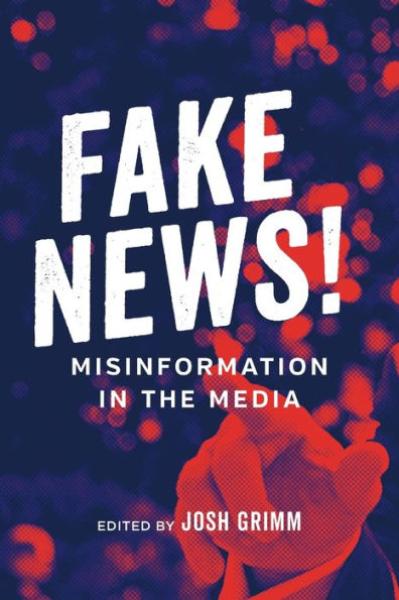Description
Whether used as a political tactic to discredit news stories and media outlets, or as a description of false information manufactured and circulated for profit, the term "fake news" holds a particularly caustic sway in twenty-first-century society. A frequent subject of cable news broadcasts, periodical coverage, and social media chatter--and a constant talking point for political pundits--its impact spans from shaping minor differences in partisanship to influencing elections. In Fake News! Josh Grimm gathers a range of critical approaches to provide an essential resource for readers, students, and teachers interested in understanding this ever--present feature of today's media and political landscape.
The opening section surveys the long history of fake news, with examples ranging from seventeenth--century satires of early newspapers to propaganda efforts in Nazi Germany, and then traces the evolution of the term over time. The following section explores how exposure to fake news impacts individuals, with particular emphasis on changes in popular discourse and the ability to assess sources critically. Essays in this section also highlight approaches developed by newsrooms and other organizations, including Facebook and Google, to fight the widespread dissemination of fake news. The volume pairs original research with articles from prominent scholarly journals, offering a wide-ranging and accessible discussion of debates central to the current post--truth era, covering topics such as social media, the Onion, InfoWars, media literacy, and the radicalization of white men.
By highlighting key components and practical methods for examining misinformation in the media, Fake News! presents in-depth analysis of a topic that remains more timely than ever.
"Whether used as a political tactic to discredit news stories and media outlets, or as a description of false information manufactured and circulated for profit, the term "fake news" holds a particularly caustic sway in twenty first century society. A frequent subject of cable news broadcasts, periodical coverage, and social media chatter and a constant talking point for political pundits, its impact spans from shaping minor differences in partisanship to influencing elections. In "Fake News!" Josh Grimm gathers a range of critical approaches to provide an essential resource for readers, students, and teachers interested in understanding this ever present feature of today's media and political landscape. The opening section surveys the long history of fake news, with examples ranging from seventeenth century satires of early newspapers to propaganda efforts in Nazi Germany, and then traces the evolution of the term over time. The following section explores how exposure to fake news impacts individuals, with particular emphasis on changes in popular discourse and the ability to assess sources critically. Essays in this section also highlight approaches developed by newsrooms and other organizations, including Facebook and Google, to fight the widespread dissemination of fake news. The volume pairs original research with articles from prominent scholarly journals, offering a wide-ranging and accessible discussion of debates central to the current post truth era, covering topics such as social media, the Onion, InfoWars, media literacy, and the radicalization of white men. By highlighting key components and practical methods for examining misinformation in the media, "Fake News!" presents in-depth analysis of a topic that remains more timely than ever"--
Joshua Grimm has put together a comprehensive text that brings together a wide range of perspectives, research projects, critical essays and case studies around fake news. Collectively, this text provides a narrative that allows readers to consider the wider historical, social, economic and political conditions that have led to the current ecosystem for misinformation in our daily lives.--Paul Mihailidis, author of Media Literacy and the Emerging Citizen: Youth, Engagement and Participation in Digital Culture
Product Details
- LSU Press Brand
- Jun 17, 2020 Pub Date:
- 0807172006 ISBN-10:
- 9780807172001 ISBN-13:
- 246 Pages
- 9.02 in * 5.98 in * 0.56 in Dimensions:
- 1 lb Weight:




